It is 3am in a local karaoke club in Huwei, Yunlin County and Huang Chun-hsiung (
At 68, he dances in step with the girls and sings with gusto. The attending male audience of puppeteers, cameramen and technicians chain-smoke and drink, as they watch Huang with respect. He not only dances and sings better than anyone else, he is also the man who reinvented Taiwanese puppet theater, brought the whole Taiwanese economy to a halt when his popular TV puppet shows were aired in the 1970s and built one of the biggest puppet film studios in the world.
Huang is the only man in Asia who was able to bring a traditional performing art like puppet theater into the mainstream of popular culture. In other Asian countries the vast and important puppet theater heritage now leads a marginal existence as a cultural tradition in need of preservation, while its audience turns en masse to other forms of entertainment.
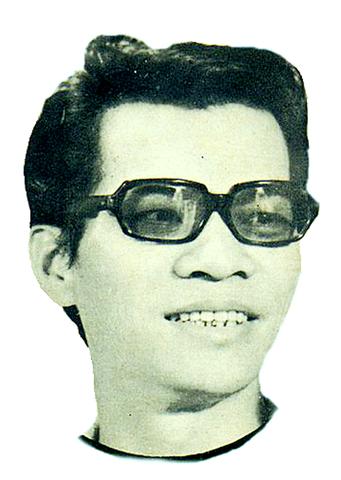
In Taiwan, on the other hand, traditional puppet theater has been commercialized and televised and is the subject of hundreds of Web sites that go as far as discussing the zodiac signs and blood types of the puppet characters.
Building on Taiwanese identity
The TV puppet stories about roaming martial arts warriors who lead the lives of lonely Byronic heroes refer to the popular Chinese martial arts novel tradition. Yet, because of the creative use of the Taiwanese language and distinct imagery, TV puppetry had become an essential part of Taiwanese identity for several generations of viewers.
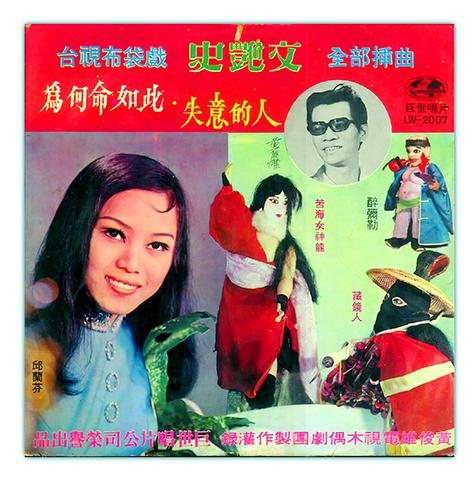
PHOTO COURTESY OF TTT PUPPET CENTRE
The story behind this unique development is that of Huang Chun-hsiung and his family.
Traditional Chinese culture assigned performers to the lowest rungs of society, together with prostitutes and criminals, and were the only people who were forbidden to take part in the imperial exams. Despite this social stigma, theater has always been a refuge for literary and creative minds at the grass-roots level.
Glove puppet theater is the newest branch of the 2,000-year-old Chinese puppet theater tradition, likely starting about 400 years ago in the coastal regions of China. It later developed into an elaborate form of theater with delicately carved puppets and stages, as well as an extensive repertoire and orchestral accompaniment. Despite their low social status, many puppeteers could actually read and write and were often well-versed in the use of the classical Chinese written language.
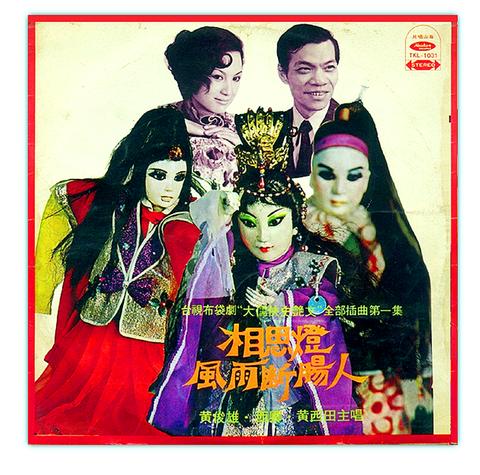
PHOTO COURTESY OF TTT PUPPET CENTRE
Huang Chun-hsiung's father, the puppeteer Huang Hai-dai (
In the 1950s, it became clear that modern comic strips, music, movies and TV would have an enormous impact on puppet theater. It was becoming increasingly difficult to keep young audiences interested in traditional puppet theater shows, and, at present, puppet theater shows are indeed entertainment almost exclusively for pensioners.
Many puppeteers started experimenting with new and larger puppets and other innovations. This form of puppet theater would be known as Golden Ray puppet theater (
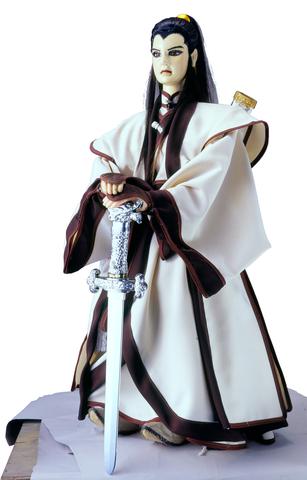
PHOTO COURTESY OF TAIWAN INNOVATIVE INTELLECTUAL PROPERTY CO
At present, there are still more than 200 theater companies in Taiwan that perform this style of puppet show. Many of the puppeteers were actually disciples of Huang Hai-dai. However, it was Huang Chun-hsiung who would refine this style and bring it to the TV screen.
The TV generation
Huang Chun-hsiung is the fourth generation of glove puppeteers in the Huang family and the second son of Huang Hai-dai. The junior Huang is definitely a chip off the old block, as he also started with puppet theater innovations at an early age. He recognized that the future of puppet theater was in mass media and not on the stage.
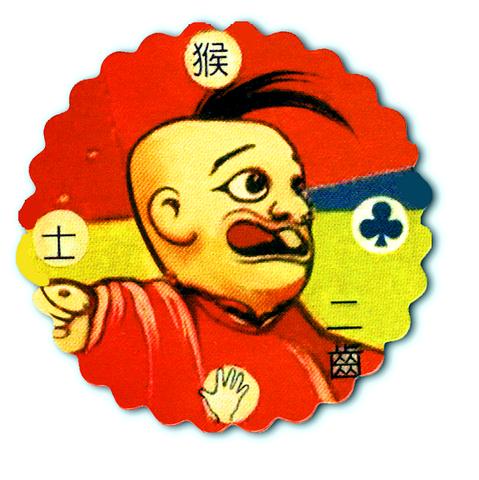
PHOTO COURTESY OF TTT PUPPET CENTRE
His most famous epic, the story of Shi Yan-wen (
When he was 28, Huang Chun-hsiung made his first puppet movie -- Journey to the West.
The movie was a great success and with the money he earned, he invested in state-of-art sound equipment. He seldom used the traditional live orchestra, but instead incorporated sound effects and a wide range of music, from traditional Chinese to modern and classical Western music, as well as music from movies and popular Taiwanese songs. He also wrote, composed, sang and recorded the popular songs that were used in the performance.
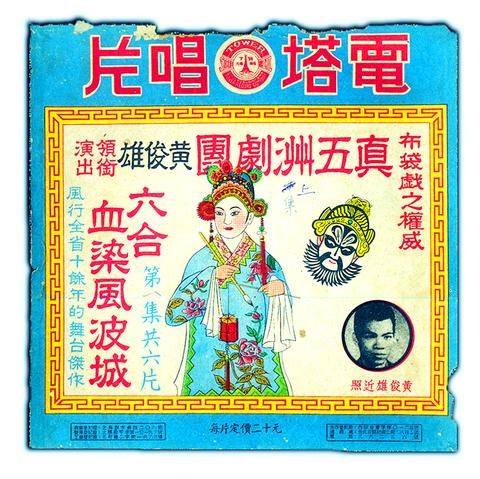
PHOTO COURTESY OF TTT PUPPET CENTRE
As another innovation, Huang Chun-hsiung started to make larger puppets for big stage performances and TV shows and used elaborate three-dimensional backdrops, creating a whole new vision of glove puppet theater. As soon as the Shi Yan-wen epic became a TV show, the reactions of the public were wildly enthusiastic. From the late 1960s onward, Huang Chun-hsiung produced over 600 TV puppet shows, staying involved in all aspects of the production, including doing the voices of all the characters.
Roaming warriors and strong women
The epic of Shi Yan-wen is more than a traditional martial arts novel, in which the righteous warriors finally win after numerous battles. The characters in the Shi Yan-wen story have complicated personalities and their life stories are not only a sequence of fights and overcoming of hurdles, but also tales of abandonment, despair, betrayal, separation and loss. The personalities and characteristics of the puppets are emphasized by their expressive voices and exteriors.
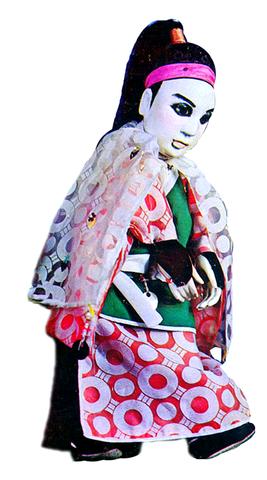
PHOTO COURTESY OF TAIWAN INNOVATIVE INTELLECTUAL PROPERTY CO
The comical and loyal Two Teeth (
Shi is a skilled martial arts expert and a scholar from southwestern Yunnnan Province in China. His father was a famous general who died when he was young. Shi was raised by his mother and became a loyal follower of the imperial dynasty, fighting opponents such as Mirror Man (
The Shi Yan-wen story contains all the themes of the traditional martial arts epics: betrayal, injustice, loyalty among righteous warriors and all the elements of Chinese ethics. The characters are not flat representatives of either virtue or evil. Like all good stories, in the Shi Yan-wen epic, the personalities of the characters and their fate created a tension that a wider audience could relate to.
The Shi Yan-wen craze and government ban
The popularity of Shi Yan-wen reached fever pitch in the early 1970s. At times, when the show was aired the whole economy basically came to a standstill, as young and old sat transfixed in front of the TV. The show was even popular among Chinese from the mainland who didn't understand Taiwanese, but could read the subtitles. Shi Yan-wen became a Taiwanese hero enjoying popularity of the same kind as Disney cartoon characters. The representation of this puppet and other characters appeared on clothing, toys, household items, virtually everything. The story was recreated for TV using real-life performers. A dozen records were produced with the songs from the TV series.
In the past 1,000 years, successive Chinese administrations banned theater performances because they were thought to cause "social upheaval." The KMT government of Taiwan was no exception. In 1974, the Shi Yan-wen show was banned, because, according to the government, it seriously harmed the economy.
After the lifting of the ban in 1982, Huang Chun-hsiung started to produce for TV again, laying the foundations for the Electric Glove Puppet Show (
In their hometown of Huwei, the Huang family runs one of the largest puppet theater film studios in the world, producing both feature-length puppet movies, TV shows and videos. The puppet studio is always brimming with activity, producing innovative and new puppet theater entertainment. Professional marketing experts and public relations companies now handle merchandising and promotion under the brand name Sue Young-man. Shi Yan-wen has recently also returned to the TV screen with a new series of 150 episodes.
Puppet theater and Taiwanese identity
Ian Buruma wrote that in Taiwan: "everything is a copy of something else." This argument does seem to hold ground, as most of Taiwan's visible culture, including the traditional puppet theater, is either from China, Japan or Western cultures. The Shi Yan-wen epic, however, was the beginning of an original Taiwanese puppet theater tradition. Although the Shi Yan-wen epic is based in China, its combination of iconography, puppets, language and music are a unique creation with a distinct Taiwanese character. This uniqueness, together with an attractive plot were the main reasons behind the show's success.
This success was brought to an even higher level by the current Electric Glove Puppet Show, in which the specific use of the Taiwanese language by the characters has been adopted by younger generations and is especially popular among university students. The show is one of the cornerstones of creative popular entertainment, catering to the need for a distinct Taiwanese identity.
This relationship between puppet theater and identity is further exemplified in Taiwanese politics. In elections we can see desperate politicians of all stripes, especially those with roots in China, holding puppets and mimicking the language of puppet theater in broken Taiwanese as part of a ritual kowtow to the puppet theater and Taiwanese culture.
As with most of Taiwanese culture, the success of puppet theater was not established by politicians, but by creative and hardworking individuals such as Huang Chun-hsiung. They took on the biggest enemy of traditional theater, mass media entertainment, and turned it into a vehicle for the promotion of a unique brand of puppet theater, at the same time creating an unprecedented development in Asian theater history.
Robin Ruizendaal wrote his PhD dissertation on Chinese marionette theater and is currently the director of the TTT Puppet Centre in Taipei.

A vaccine to fight dementia? It turns out there may already be one — shots that prevent painful shingles also appear to protect aging brains. A new study found shingles vaccination cut older adults’ risk of developing dementia over the next seven years by 20 percent. The research, published Wednesday in the journal Nature, is part of growing understanding about how many factors influence brain health as we age — and what we can do about it. “It’s a very robust finding,” said lead researcher Pascal Geldsetzer of Stanford University. And “women seem to benefit more,” important as they’re at higher risk of

Eric Finkelstein is a world record junkie. The American’s Guinness World Records include the largest flag mosaic made from table tennis balls, the longest table tennis serve and eating at the most Michelin-starred restaurants in 24 hours in New York. Many would probably share the opinion of Finkelstein’s sister when talking about his records: “You’re a lunatic.” But that’s not stopping him from his next big feat, and this time he is teaming up with his wife, Taiwanese native Jackie Cheng (鄭佳祺): visit and purchase a

April 7 to April 13 After spending over two years with the Republic of China (ROC) Army, A-Mei (阿美) boarded a ship in April 1947 bound for Taiwan. But instead of walking on board with his comrades, his roughly 5-tonne body was lifted using a cargo net. He wasn’t the only elephant; A-Lan (阿蘭) and A-Pei (阿沛) were also on board. The trio had been through hell since they’d been captured by the Japanese Army in Myanmar to transport supplies during World War II. The pachyderms were seized by the ROC New 1st Army’s 30th Division in January 1945, serving

The People’s Republic of China (PRC) last week offered us a glimpse of the violence it plans against Taiwan, with two days of blockade drills conducted around the nation and live-fire exercises not far away in the East China Sea. The PRC said it had practiced hitting “simulated targets of key ports and energy facilities.” Taiwan confirmed on Thursday that PRC Coast Guard ships were directed by the its Eastern Theater Command, meaning that they are assumed to be military assets in a confrontation. Because of this, the number of assets available to the PRC navy is far, far bigger